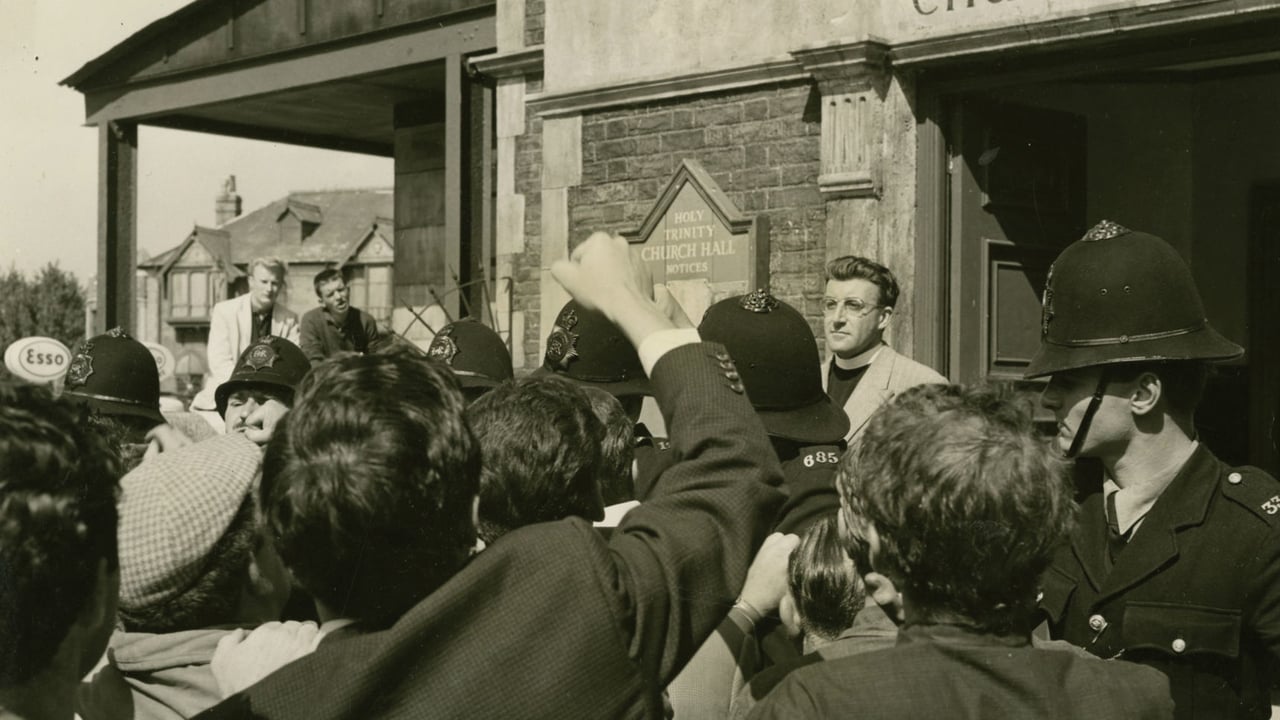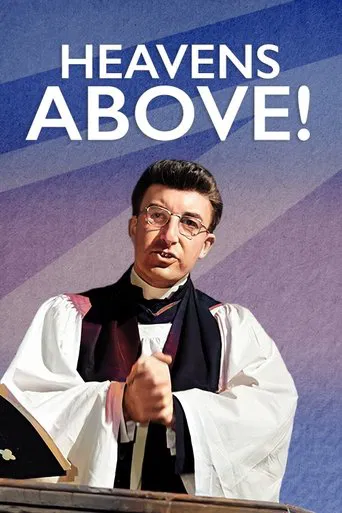

A Boulting Brothers Production for British Lion-Romulus, filmed at Shepperton Studios. Copyright 1963 by Charter Film Productions. New York opening at the Sutton: 20 May 1963. U.S. release through Janus Films: May 1963. U.K. release through British Lion: 8 September 1963. London opening: 23 May 1963. Australian release through British Empire Films: November 1963. Sydney opening at the State. 10,638 feet. 118 minutes. Cut to 105 minutes for U.S. release. (Available on an excellent Optimum DVD. Starz/Anchor Bay have the PAL version for U.S.A. customers. Alas, I can't say if this version is the censored U.S.A. release. You'll need to check the running time).SYNOPSIS: Due to a clerical error, the wrong Reverend Smallwood is appointed to the living of a conservative British town.NOTES: Number eight on the 1963 list of the top money-making films released in the U.K. VIEWER'S GUIDE: Most suitable for all, although of course, parents, teachers and clergy should prepare themselves to answer some very tricky questions.COMMENT: I missed out on seeing the American version of this film. If the cutting has been loving and sympathetic, "Heavens Above!" would offer marvelous entertainment. For the only thing wrong with the film as shown in England is that it tends to out-stay its welcome. The producers should have taken up the good old blue pencil at the scripting stage. Or they should have had the courage to cut themselves, not leave it to Janus. I suppose they felt they'd spent so much money that they wanted to see it all on the screen. For most of its running time, "Heavens Above!" is an enjoyable if heavy-handed farce that benefits from its never-ending parade of dependable British character players handing out emphatically pointed lines of satire. The film even dares to raise troublesome questions of Christian social morality. And of course it really puts the boot into the Church of England's administration. The film deserves to be taken seriously, even if the Boultings themselves are obviously unsure how importantly their Smallwood is meant to be taken. Sellers, however, leaves no doubt in his sermons, all of which are presented with transparent sincerity. In fact, except for the final absurdities, Sellers provides a finely etched, well-rounded characterization. It's a pity the director forces him to lapse now and again into slightly inappropriate slapstick.Production values are first-class, with a special pat on the back to Albert Witherick for his marvelously dingy, appropriately rundown church and vicarage sets.
... View MoreThere is a very rich wealth of comedic talent involved throughout this film. Sadly, the majority are wasted in shallow stereotypical caricatures which en-masse, eventually drag the fairly simple premise (answered very pointedly by the film's title) away from the pleasing light-heartedness of films like "Two Way Stretch" or the benchmark satire of "I'm All Right Jack" to something that ends up leaving a bit of a nasty taste in the mouth. The only reason to watch this film is to enjoy the work of Peter Sellers. The meek sincerity of his Rev. John Smallwood is unblemished throughout, but what should be the pointed nature of his eventual salvation at the end of the film jars badly. We witness that both the church and the odious parish emerge relatively unscathed, but Smallwood's deliverance doesn't gel and appears as though it were tacked on regardless when the film-makers couldn't think of anything else to end the film. Alongside Sellers, only George Woodbridge is particularly notable, playing very much against type as a fairly shrewd Bishop.
... View MoreHeavens Above! has so much going for it - a wonderful and very gentle performance by Sellers, a who's who of British comedy from the late 1950s, and the Boulting Brothers at the helm. This is a film that stands the test of time and remains both fun and interesting and a fascinating take on Anglicanism. In Britain, children of a certain class went to privileged school with the eldest son being shipped off to serve as an officer, or join the Foreign Office for the larger good of the Empire, and the second son would go to the City or the Church. Anglican vicars aren't meant to be like Peter Seller's John Smallwood - who really does hold to the Gospel rather than doctrine, and is appointed vicar, by mistake, of a decidedly complacent and snooty town. What follows gently pokes fun at the double standards.All in all, this remains one of Seller's gentlest, truest, and straightest characterisations. Like Alec Guinness he really does become the character he's playing - from the hair to the accent to the smallest gestures, but more than that, here, is the heart. He captures something ethereal that we would all recognise as sincerity and good intentions.When he introduces true gospel values everything, of course, starts to fall apart. Historically, this is interesting in that Billy Graham has come to Britain and there is something of that spirit about this; but it is no way heavy handed or blunt.Heavens Above! resorts to a weak ending - wish he'd been sent to the East End of London or Liverpool - but it remains a wonderful film well worth the time to catch when it comes around.
... View More"Heavens Above!" is a barbed satire that cuts both ways, ridiculing organized religion for its complacence and its unrealistic aspirations and humanism regarding the perfectibility of man, especially the working-class kind. Though far from the funniest Peter Sellers comedy, it certainly is worthy in its own unique way.Sellers plays Rev. John Smallwood, an Anglican prison chaplain accidentally assigned to the affluent community of Orbiston Parva. A sincere man of faith, Smallwood tries to drum up a little church fervor from his largely lapsed congregation, preaching the Gospel as Living Word rather than as aural wallpaper for weddings and funerals. Yet every earnest effort only stokes greater amounts of selfishness, even brutality."There aren't enough real Christians about to feed a decent lion," Smallwood laments.At the same time, he must deal with the miserable quality of the clergy around him, like his own bosses in the Church of England hierarchy who strain only to keep their rich donor base happy and generous or the odd Pentecostal preacher who offers up damnation-filled sermons: "It's only the fires of hell that keep the churches warm.""Heavens Above!" is a comedy of despair. If there is a God, it seems to say, He has better sense than to waste His time with blighted human riffraff like the Smiths, an itinerant family who leeches off Smallwood while feigning piety. Sellers is terrific, though in a largely straight performance, pulling us in with his naive gentility to the point where a lot of the gags turn painful when he is the butt of humor. The closest Sellers gets to laugh-getting - other than when Smallwood unknowingly snacks from a bowl of dog treats - is the opening, where he provides an uncredited voice-over as an American narrator introducing us to the uninspiring sight of Orbiston Parva. However much he stumbles and is tripped up, Smallwood is simply too nice a character to laugh at.For all the apparent agnosticism in "Heavens Above", there's a strain of true religious belief in Smallwood's situation. Perhaps it's because the idea came from Malcolm Muggeridge, the last faith-friendly satirist England has produced. Smallwood is presented as a man of good works, but also doctrinal zeal. His scorn for the local pep-pill product "Tranquilax", it seems, is largely due to its proclaiming itself the "three-in-one restorative". For him, the only 3-in-1 restorative is the Father, Son, and the Holy Ghost."Heavens Above!" is also interesting for the fact it catches Sellers just on the cusp of becoming an international star, still relatively round in body, making one of his last films aimed exclusively at his home British market. Like the later "Hoffman" and "Being There", this shows just how well Sellers could carry a film without resorting to silly accents or slapstick.The film's directors, John and Roy Boulting, do well to set Sellers up with an ace supporting cast recognizable from other Sellers productions of the period, including George Woodbridge and Cecil Parker as a pair of agreeably venal curates; Irene Handl and Eric Sykes as Mr. and Mrs. Smith, heads of a scruffy, thieving clan; and Kenneth Griffith as the fire-and-brimstone preacher.If only they cut that silly ending! There's other issues, too, like a penchant for slow camera zooms without reason, and the way the movie piles on Smallwood at the expense of comedy, but the out-of-left-field ending stings worst, an attempt at giving the film a falsely up note. Alas, when you really think about it, it only leaves Smallwood worse off than ever.But you do care about the guy, a sign someone was doing something right. Obviously that includes Peter Sellers. With more laughs and a tighter ending, "Heavens Above!" would have ranked among his greatest films. As it is, it's pretty good all the same, food for thought in our secular times.
... View More